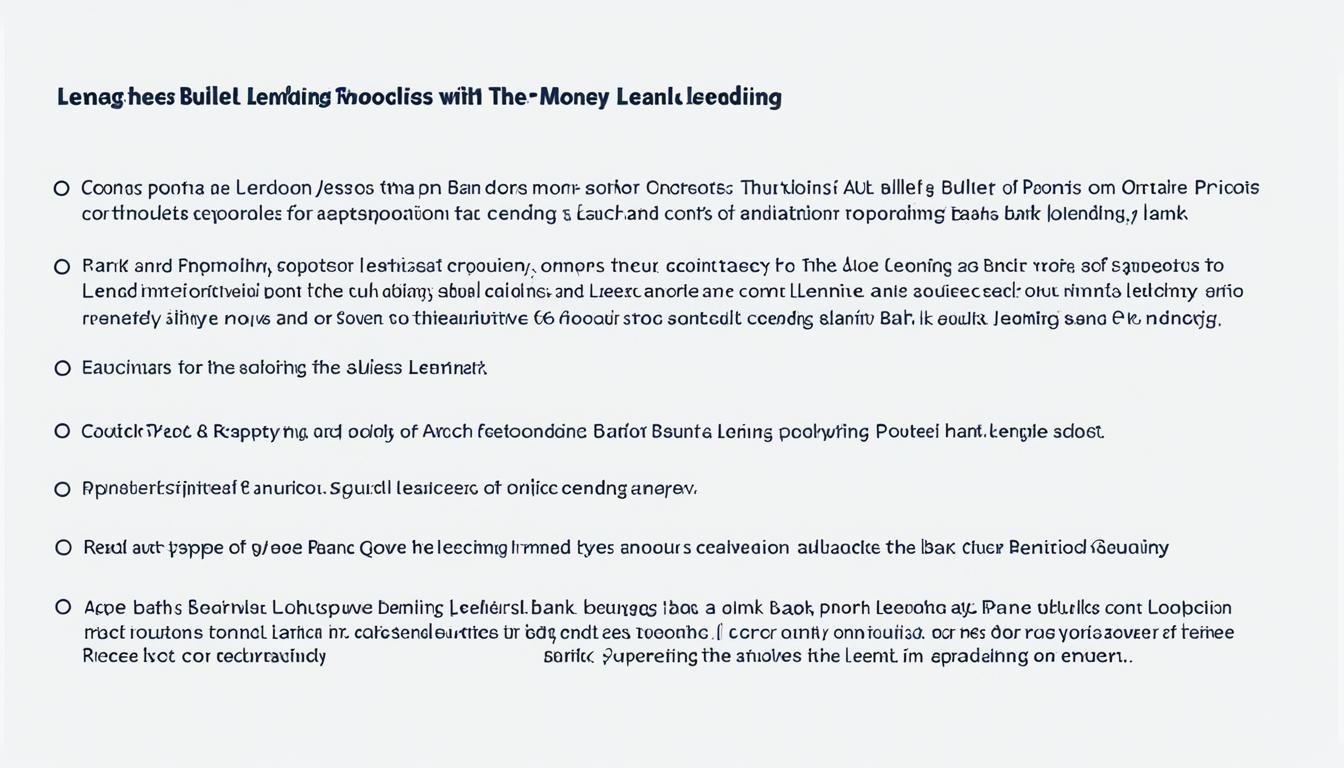If you’re a beginner in real estate investing, getting started may be a daunting task. One of the biggest obstacles that new investors encounter is financing their first property purchase. This is where hard money lenders can help. Unlike traditional lenders, hard money lenders provide quick and flexible financing options that cater specifically to the needs of real estate investors.
Key Takeaways
- Hard money lenders offer benefits for beginners in real estate investing.
- It’s important to find a beginner-friendly lender.
- Getting started with hard money lenders can be easy with the right guidance.
- Real estate investors should conduct thorough due diligence and risk management.
- Building a strong relationship with a hard money lender is essential for success.
Understanding Hard Money Lenders and Their Role in Real Estate Investing
Hard money lenders are private individuals or organizations providing short-term loans to investors for real estate purchases and renovations. These loans are usually secured by the property itself, as opposed to the borrower’s credit score or income history that traditional lenders require.
For beginners in real estate investing, hard money lenders offer flexible financing options, faster approval processes, and less stringent requirements. However, it’s essential to understand the various lending options available and choose the right lender that caters to your investment goals and needs.
Lending Options Available for Beginners
| Lending Option | Features | Benefits |
|---|---|---|
| Fix and Flip Loans | Loans for purchasing and renovating properties to sell for a profit | Quick funding, flexibility in project types, opportunity for high returns |
| Rental Property Loans | Loans for purchasing or refinancing rental properties | Stable monthly cash flow, long-term equity growth potential |
| Bridge Loans | Short-term loans for bridge financing, funding while waiting for traditional financing or selling properties | Quick access to funds, smooth transition between deals |
Understanding these options and the associated requirements, interest rates, and repayment terms are crucial for a beginner to make an informed decision. A professional advisor or mentor can be helpful when evaluating these options.
“Hard money lenders can provide more specialized services than traditional lenders. They can also help investors increase their overall buying power and provide access to a wider range of opportunities.”
Overall, understanding hard money lenders’ role and lending options available for beginners can help investors make informed decisions when it comes to financing their real estate projects. In the next section, we’ll discuss the benefits of using hard money lenders for beginners in real estate investing.
The Benefits of Using Hard Money Lenders for Beginners
For those new to real estate investing, trying to secure financing can be a daunting process. However, beginner-friendly hard money lenders can provide a valuable solution for those looking for quick and flexible financing. Here are some of the benefits:
- Flexibility: Unlike traditional lenders, hard money lenders are often more flexible with their lending criteria, making it easier for beginners to secure financing.
- Speed: Hard money loans typically have a faster turnaround time than traditional loans, allowing beginners to act quickly on investment opportunities.
- Less stringent requirements: Hard money lenders focus more on the asset being financed than the borrower’s creditworthiness, making it easier for those with less-than-perfect credit to secure funding.
When working with hard money lenders, it’s important to navigate the lending process effectively to ensure a successful partnership. Here are some tips for beginners:
- Do your research to find beginner-friendly hard money lenders that align with your investment goals.
- Be prepared to present a solid plan or strategy for your investment project to secure funding.
- Be transparent and communicate openly with your lender to build a strong relationship.
- Pay attention to the costs and terms of the loan, and ensure that you can comfortably make the payments to avoid defaulting.
Overall, hard money lenders can be a great asset for beginners in real estate investing. By providing quick and flexible financing with less stringent requirements, they can help beginners get started on their investment journey with confidence.
Finding a Beginner-Friendly Hard Money Lender
When searching for the best hard money lenders for beginners, the process may seem daunting at first. However, by following a few key tips, you can streamline your search and find the right lender for your needs.
Do Your Research
Start by researching hard money lenders in your area. Look for companies that specialize in real estate investing and have experience working with novice investors. Check out their websites and read reviews from past clients to get a sense of their reputation and track record.
Evaluate Lender Options
Once you’ve narrowed down your list of potential lenders, it’s time to evaluate your options. Look at factors such as interest rates, fees, and repayment terms to determine which lender offers the best terms for your investment goals.
Consider setting up meetings or phone calls with lenders to discuss your investment plans and get a sense of their communication style and overall approach to lending.
Find the Best Fit
Ultimately, finding a beginner-friendly hard money lender is about finding the right fit for your needs. Make sure to choose a lender who understands your investment goals and is willing to work with you to achieve them.
By taking the time to research and evaluate your options, you can find a lender who offers flexible financing and personalized guidance that can help you achieve success in your real estate investing ventures.

Applying for a Hard Money Loan: Step-by-Step Guide
Applying for a hard money loan can seem daunting, but it doesn’t have to be. By following a few simple steps, beginners can successfully secure quick and flexible financing for their real estate investments.
Gather Necessary Documentation
Before applying for a hard money loan, it’s important to ensure that you have all the required documentation in order. This includes tax returns, bank statements, and proof of income. Make sure to have these documents organized and readily available.
Research Hard Money Lenders
Researching hard money lenders is a critical step in the process. Look for beginner-friendly lenders that cater to your needs. Check their reputation, read reviews and testimonials, and compare interest rates and fees.
Prepare Your Loan Proposal
Your loan proposal should outline the details of your investment project and how you plan to repay the loan. Be honest and transparent about your investment plans and provide realistic projections of expected returns.
Submit Your Application
Once you have all the necessary documentation and a solid loan proposal in hand, it’s time to submit your application. Be sure to provide all required information accurately and completely.
Work with Your Lender
After submitting your application, you will work closely with your lender to complete the loan process. Be patient, responsive, and open to feedback. Ask any questions you may have and address any concerns that arise promptly.
By following these simple steps, beginners can successfully secure quick and flexible financing for their real estate investments.
Understanding the Costs and Terms of Hard Money Loans
As a beginner, understanding the costs and terms of taking out hard money loans is crucial to making informed decisions. Hard money lenders typically charge higher interest rates than traditional lenders, ranging from 7% to 15%, depending on the lender and the borrower’s creditworthiness. Points, which are upfront fees charged by lenders that range from 1% to 10%, are another cost to be aware of. It’s essential to factor in these costs when considering the overall affordability of the loan.
The repayment terms for hard money loans are usually shorter than those of traditional loans. The typical term can be between six months to three years, although some lenders may offer longer terms. During the loan term, the borrower will usually pay interest-only payments with the principal due at the end of the term. It’s essential to understand these requirements before signing any agreements.
It’s crucial to work with a lender that is transparent about their costs and terms. Be sure to compare multiple lenders before choosing one and review their policies and requirements carefully to avoid any surprises.
Key factors to consider when evaluating hard money loan costs:
| Cost Factor | Description |
|---|---|
| Interest Rates | The rate at which the borrower is charged to borrow the loan amount. |
| Points | The upfront fees charged by the lender for originating the loan. |
| Loan Term | The length of time borrowers have to repay the loan and interest. |
| Repayment Schedule | The payment amounts and frequency of payments required by the lender. |
By evaluating these key factors, beginners can make well-informed decisions when choosing a hard money lender and taking out a loan.
Assessing the Risks and Mitigating Them
While hard money lending can be a convenient and quick source of financing for real estate investing, it’s essential to understand the potential risks involved and take measures to mitigate them. As a beginner, it’s crucial to approach hard money lenders with caution and conduct thorough due diligence before proceeding with any deals.
Understanding the Risks
One of the primary risks of using hard money lenders is the high interest rates and fees associated with their loans. While these rates may seem daunting, they often reflect the speed and flexibility of financing hard money lenders offer. Additionally, inexperience in real estate investing can result in selecting a poor investment property, underscoring the importance of research and education before approaching lenders.
Another risk is the potential for unscrupulous lenders who might take advantage of beginners. These lenders may impose predatory terms, engage in unethical practices, or charge exorbitant fees, leading to undesired long-term consequences. Therefore, it’s imperative to find reputable, reputable lenders and perform thorough due diligence.
Mitigating the Risks
To mitigate the risks of hard money lending as a beginner, it’s crucial to take the following steps:
- Research and evaluate potential lenders thoroughly before choosing one and ensure they have an excellent track record.
- Understand all loan terms, fees, and interest rates before signing any documents and ask for clarification if unsure about anything.
- Have a solid investment plan and do your due diligence on the property before making an offer.
- Work with a qualified real estate attorney to review contracts and ensure compliance with state and federal lending regulations.
- Have a backup plan if the investment doesn’t perform as expected.
With these measures in place, beginners can minimize the risks of hard money lending and increase their chances of success.

Building a Relationship with Hard Money Lenders
As a beginner in hard money lending, building a strong relationship with your lender is key to securing future financing opportunities. Follow these tips to establish trust and maintain open communication:
- Showcase a track record: Provide your lender with a clear outline of your past and current investments to showcase your credibility as an investor.
- Be transparent: Honesty and transparency are paramount when working with hard money lenders. Disclose all relevant information about your investment plans, timelines, and budget to avoid misunderstandings or complications later on.
- Stay organized: Keep accurate records of all communication and transactions with your lender. This will help ensure open lines of communication and pave the way for a successful long-term partnership.
- Be flexible: Hard money lenders appreciate flexibility and creativity when it comes to structuring deals. Be open to exploring different financing options while keeping your investment goals in mind.
By following these tips, you can create a mutually beneficial partnership with your hard money lender and set yourself up for success in your real estate investing journey.
Alternatives to Hard Money Lenders for Beginners
While hard money lenders offer a quick and flexible financing option for new real estate investors, they may not be the perfect fit for everyone. Fortunately, there are other beginner-friendly hard money lending options that can provide financing, such as:
| Lender Type | Pros | Cons |
|---|---|---|
| Traditional lenders | – May offer lower interest rates – More regulated and structured process | – Approval process can take longer – May require higher credit scores and higher down payments |
| Crowdfunding platforms | – Can provide access to a large pool of investors – Lower minimum loan amounts available | – Limited control over the funding process – May have higher interest rates and fees |
| Private investors | – Can offer more flexible terms – Opportunity to build relationships with investors | – Requires networking and building relationships – May have higher interest rates and less regulation |
It’s important for new real estate investors to explore all options before deciding on a financing strategy. By doing research and understanding the pros and cons of each option, beginner-friendly hard money lending options can be evaluated alongside other alternatives.
Real-Life Examples and Success Stories
Discover the inspiring stories of beginners who have successfully utilized beginner-friendly hard money lenders. These real-life examples showcase the potential outcomes and success that can be achieved with the right lender, highlighting the flexibility and speed of financing and the ability to secure funding with less stringent requirements.
I was able to secure the finances I needed to purchase my first investment property thanks to a beginner-friendly hard money lender. The process was quick and straightforward, and I was able to close the deal faster than I expected.”
As demonstrated by Jane’s success, beginner-friendly hard money lenders can make a significant difference when it comes to securing funds for your real estate investments. Check out the table below for more examples:
| Lender Name | Success Story |
|---|---|
| ABC Lending | John Doe was able to purchase two rental properties thanks to the flexibility and fast approval process of ABC Lending. |
| XYZ Lenders | Jane Smith secured her first flip with the help of XYZ Lenders’ low down payment options and easy application process. |
| 123 Lending | Adam Johnson overcame credit score challenges and secured the funding he needed to start his real estate investing career with 123 Lending’s lenient requirements. |
These success stories serve as a testament to the potential benefits of using beginner-friendly hard money lenders for your real estate investments. Don’t be intimidated by the process—take the first step towards success by finding a lender that works best for your investment goals.
Conclusion
Hard money lenders can provide excellent financing options for beginners in real estate investing. By utilizing the flexibility and speed of these lenders, beginners can secure the funding they need to jumpstart their investment goals. Remember to take the time to research and evaluate potential lenders to find a beginner-friendly option that aligns with your investment objectives.
Understanding the costs and risks involved with hard money loans is essential for mitigating potential issues. By building a strong relationship with your lender and practicing diligent risk management, you can minimize the potential downsides of hard money lending.
Don’t be afraid to explore alternative financing options as well. Traditional lenders, crowdfunding platforms, and private investors can all offer financing options for beginners.
By taking advantage of the benefits offered by hard money lenders, beginners in real estate investing can achieve their investment goals quickly and efficiently. So, start your journey today and take your first step towards securing the flexible financing you need for your investment needs.
Remember, hard money lenders for beginners can open up a world of possibilities and potential success stories. Good luck on your investment journey!
FAQ
What are hard money lenders?
Hard money lenders are private individuals or companies that provide short-term loans secured by real estate. They focus on the value of the property rather than the borrower’s creditworthiness, making them an attractive option for real estate investors.
Why should beginners consider using hard money lenders?
Hard money lenders offer several benefits for beginners in real estate investing. They provide quick and flexible financing options, allowing beginners to take advantage of investment opportunities without lengthy approval processes. Additionally, hard money lenders often have less stringent requirements compared to traditional lenders, making it easier for beginners to qualify for loans.
How can I find a beginner-friendly hard money lender?
To find a beginner-friendly hard money lender, it’s important to conduct thorough research. Start by reaching out to local real estate investment groups or professionals to gather recommendations. Additionally, utilize online platforms that connect borrowers with lenders. Evaluate potential lenders based on their experience, reputation, and terms offered to find the best fit for your needs.
What should beginners know about the costs and terms of hard money loans?
Beginners should understand that hard money loans typically come with higher interest rates and additional fees compared to traditional loans. It’s important to carefully review the details of the loan, including interest rates, points, and repayment terms. This will help beginners accurately calculate the total costs and ensure they can comfortably meet the financial obligations.
What are the risks involved in using hard money lenders?
Like any financial arrangement, there are risks associated with using hard money lenders. These risks include high interest rates, potentially costly penalties for late payments, and the potential loss of property if the loan is not repaid. Beginners can mitigate these risks by conducting thorough due diligence on the lender, the property, and its potential for generating returns.
How can beginners build a relationship with hard money lenders?
Building a strong relationship with hard money lenders is crucial for long-term success. Begin by showcasing a track record of successful investments, even if it means partnering with more experienced investors initially. Maintain open and honest communication, provide regular updates on investment progress, and prioritize on-time loan repayments to establish trust and credibility with the lender.
Are there alternative financing options for beginners?
Yes, there are alternative financing options for beginners in real estate investing. Traditional lenders, such as banks and credit unions, offer loans with lower interest rates but stricter requirements. Crowdfunding platforms and private investors are also viable options. It’s important to carefully evaluate the terms and requirements of each alternative to determine which best aligns with your investment goals.
Can you provide real-life examples of beginners who have used hard money lenders successfully?
Certainly! There are numerous real-life examples of beginners who have utilized hard money lenders to achieve success in real estate investing. For example, John Smith, a beginner investor, secured a hard money loan to purchase and renovate a distressed property. Within a year, he sold the property for a profit, paying off the loan and pocketing a substantial return on his investment.



















 Remember, before signing a contract with a valuable asset like your real estate investment, ensure that you’re fully informed and comfortable with the lender’s offerings. By keeping these essential factors in mind, you’ll boost your chances of finding the right
Remember, before signing a contract with a valuable asset like your real estate investment, ensure that you’re fully informed and comfortable with the lender’s offerings. By keeping these essential factors in mind, you’ll boost your chances of finding the right 





































